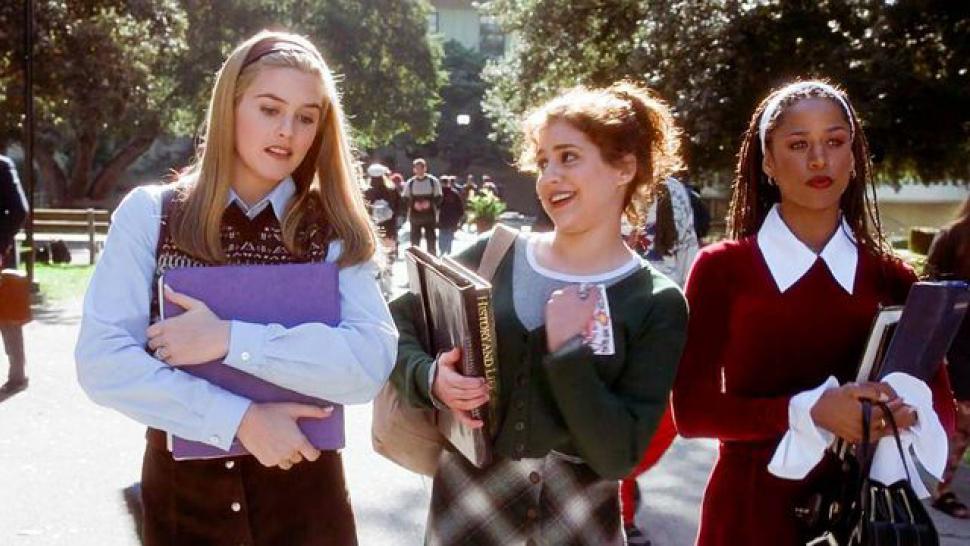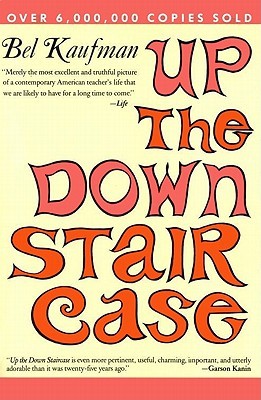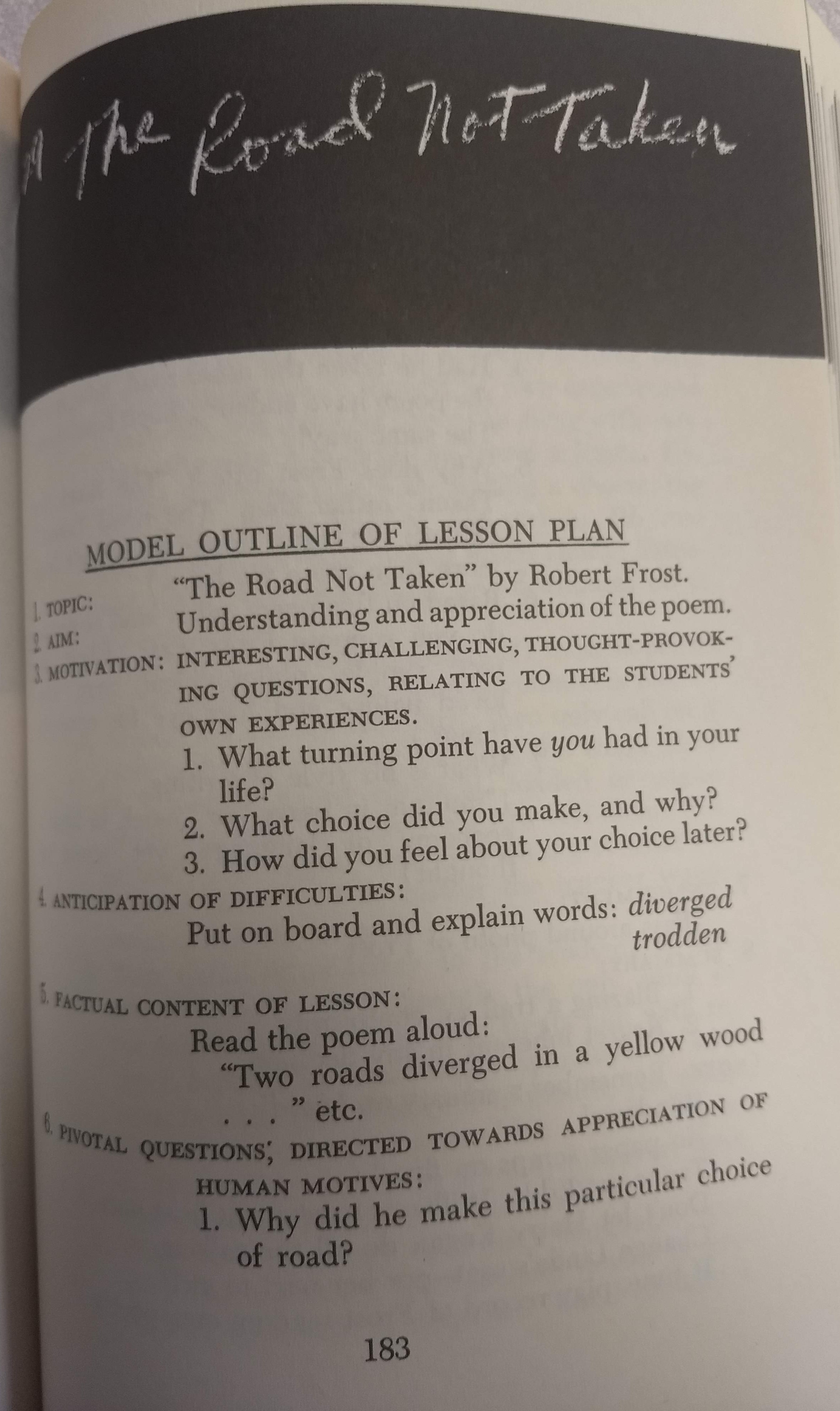It’s that time again! Happy back to school to all the teachers, students, parents, and child care providers out there! Today’s review is of a book all about one woman’s first year teaching. How do you think it went? Read on. . .

With that intriguing title, Up the Down Staircase caught my attention in a used book store a while back. I took it home to hoard until the name popped up as the oldest book that I own on my TBR of female writers. Bel Kaufman, born and raised in Russia, moved to the United States with her family when she was twelve and practically fell into teaching when she decided to take an education class in college because her best friend was enrolled. In front of the room during her student teaching, she knew she found her calling.

My copy of Up the Down Staircase was republished in 1991 with an introduction by Kaufman. In it, she notes, “Some reviewers paid me the ultimate compliment: They thought I had merely collected and arranged the material in the book. But everything in the novel is invented, except a few directives from the Board of Education, which I had to tone down for credibility.”
The novel is about Sylvia and her first year teaching high school English and home room in a New York City public school. We know this story: overworked teachers, students who don’t care, a draconian administration and disorganized Board of Education. Surprisingly, all of Up the Down Staircase is formatted as pieces of communication, not paragraphs: Sylvia’s letters to her friend Ellen, intraschool communications to other teachers, circulars from the principal or his assistant, bits of students’ assignments or their notes from Sylvia’s suggestion box, and notes from the Board of Education are some examples. Originally published in 1964, I was delighted to discover Kaufman had fought for and won the right to publish her book in the atypical form she desired.

Let me start by noting that my eleven years of teaching were all in college classrooms, but I did have many dual-enrolled high school/college students and have worked with sixteen-year-old students. Kaufman’s presentation of teacher life is so painfully realistic that I actually had a heart palpitation while reading (it feels like a big woosh and then a thud in your chest). To get her students writing, Sylvia asks them to describe their best friend. What she got back was so familiar to me:
My best friend is a good book. I enjoy good books that are educational very much. Books help your grammer and spelling. Also increase your vocabulary. I am a great reader of books. My best favorite is “Antony and Cleopatra” by Shakespeare. In this book I like the part where the author tries to show love. Where Elizabeth Taylor and Richard Burton make love which I like. I like other good books too, mostly classical.
Oddly, any student I met who felt that they were a prolific reader or writer was always one of the poorest in the class. My suspicion is that this student had a teacher who told them they were strong in English class, so the student failed to continue to develop his/her skills.

Another student implies that what they learn in class is of no value nor does it connect to their lives (poverty, joblessness, teen pregnancy, death, disabled or deceased parents, hunger): “Why do we study the Odyssy? Because everybody in high school at one time or another read it and now we have to read it because it’s our turn.” I was internally laughing and shaken by how little students change (which Kaufman also notes in her introduction).
When Sylvia tries to connect Ancient Greek Myths to her students, the other teachers warn her to avoid caring too much, as empathy for hundreds of students will eat her alive. Again, I found this relatable based on things I was told as a professor at different colleges and thus found a compelling reason to keep reading: so I could see my experiences but at a distance through Sylvia’s.
When I tell eager future teachers what my experiences were like, they politely imply that they will teach “the whole person” and use a new approach of respect and open discussions and creative assignments. HA, I say; as if the rest of us are grumpy, reading-from-the-PowerPoint monkeys. As if you are the first; as if you’re going to school us on something you’ve never done. Okay, now I am getting grumpy. Anyway! Sylvia is one of those naive hopefuls, and her first day sets the scene perfectly through her descriptions of what happened in an intraschool communication to a seasoned teacher, Bea:
I checked off 2 1/2 items from some 20 on the list of things to be done.
A boy fell of his chair.
Nothing in my courses on Anglo-Saxon literature, or in Pedagogy, or in my Master’s thesis on Chaucer had prepared me for this. I had planned to establish rapport, a climate of warmth and mutual respect. I would begin, I thought, with First Impressions: importance of appearance, manners, speech, on which I’d build an eloquent case for good diction, correct usage, fluent self-expression. From there it would be just a step to the limitless realms of creativity.
This first day failure establishes both setting and character well and prepares readers for the rest of Sylvia’s first year teaching. Kaufman captures teaching experiences beautifully within her chosen form.
A smattering of minor characters rounds out the school. While students are often the first blamed for a teacher’s misery, the administration and staff can make things challenging. Sylvia receives a circular declaring, “DISMISSAL BELL WILL RING AT 3:05 SHARP. THIS, HOWEVER, IS UNCERTAIN.” The librarian is possessive of books — she doesn’t want students in the library or to touch books, and is happy to blacklist them — and the guidance counselor has zero background in social work; she “swoops upon the kids and impales them with questions about masturbation.”

The English department chair is rumored to care and be a strong teacher, but even he creates frustrations. When he asks his faculty to tell him how many students are in each class so they can be shuffled around and average each room, Sylvia dutifully reports her class numbers: “. . . my average is not 33 but 44 3/5 students per class. . . . Also, the Book Room has no Mill on the Floss — only Julius Caesar, and only enough for three-fourths of the class.” The chairperson merely sends a note back stating, “Let it be a challenge to you.”
It wouldn’t be a school novel if the teacher didn’t have one “bad boy” student whom she tries to tame. For Sylvia, it’s Joe Ferone. You wait and wait to see what happens between the two as he pushes her buttons and she counters with infinite patience. According to the author, readers send her letters asking what happened to Ferone, as if he were real, a testimony to Kaufman’s ability to write a compelling story.
It’s not all Blackboard Jungle or To Sir, With Love — these students face real problems that won’t be solved thanks to one teacher. Up the Down Staircase is a compelling, emotional, realistic novel, set in 1964 but just as relevant today, about a a new teacher’s journey into the disastrous American school system.

I love the title of this book – my secondary school had ‘up’ and ‘down’ staircases for crowd control, but we were forever sneaking up the down staircase because it was more convenient for classes… What it has to say about teaching also sounds very familiar from my academic research!
LikeLike
Based on your reply, I think you would love this book, Laura. I hope you seek out a copy and give it a read. It’s quick, yet highly engaging and emotional!
LikeLiked by 1 person
That’s such a great title! It’s always exciting to see your own experiences reflected in a book, and to feel the author did them justice.
LikeLike
Although the title is meant to make you shake your head in disbelief, I kind of wonder why my high school didn’t have up and down staircases. Then again, our stairs were quite wide.
LikeLike
It made me picture that old classic of someone accidentally trying to go up a downwards moving escalator, lol
LikeLike
Having taught in America’s disastrous college system, I sympathize with this book. I do think it be interesting that people who read it didn’t think it was fictional. I also like the formatting. All I know is when I tell some of me college teaching disaster stories people think I be exaggerating when I actually have toned it down. I enjoyed teaching a lot more through seminars and master classes. I have no skills to inspire people to learn. They have to already have an interest.
x The Captain
LikeLike
I’m going to toot my own horn and say that I had a number of “Oh, Captain! My Captain!” type of moments. HOWEVER. That just cannot correct the fact that there are five *$&^heads in the back just bringing EVERYTHING down. And over eleven years, they brought me down. I sometimes think about going back to teach ONE class.
LikeLike
Sounds like a really good book, especially since I’ve never heard of it. I’m sure you had many moments of nostalgia with your teaching experience?
LikeLike
I had many moments of sheer terror, including an actually heart palpitation and some nightmares.
LikeLiked by 1 person
ha! This sounds like an awesome book, I love the format. And, the way you describe talking to teaching hopefuls reminds me ALOT of speaking with people who are pregnant with their first kid. I generally don’t mince words and tell them how hard it’s going to be, and them assure me they’re going to do things differently, really ‘listen’ to the kid, etc. From what I’ve heard from other parents, this is a very universal experience, and it’s what helps the human race procreate. If we all knew how hard it was going to be before we conceived, we would never conceive at all. And now you’re thinking “but why do we have a second kid, a third, etc?” The answer is, we want at least two people around to help take care of us as we age AND they should keep each other busy when they’re young 🙂
LikeLike
Hahahaha, you have me in stitches, Anne. I think you’re totally right about new teachers and new parents being VERY similar — I hadn’t thought of that, but it makes perfect sense. My nieces are 10 1/2 months apart, and you’re right; they absolutely keep each other entertained. I think the bigger the gap in ages, the less that’s true. I might be wrong, though. I don’t have any children!
LikeLiked by 1 person
I never went to a school with a staircase, so that’s a rule I never encountered. I did get sent home once for wearing shorts in year 11, but that was just the principal scoring points off my father who was then district inspector. I often gave teachers a hard time but I mostly enjoyed school and only wish it had been more rigorous. My father was a teacher, my son’s a teacher but I was never tempted. It wasn’t kids I feared, it was the education bureaucrats I saw my father dealing with every day, and one of whom he eventually became.
LikeLike
Kaufman highlights the ridiculous, draconian nature of the administration and School Board, which would be the bureaucracy end of things in the States, and how all the paperwork and mindless punishments get in the way of actually teaching. Frequently, the main character’s classes are interrupted when some admin or another comes in to give an asinine announcement, for instance. I don’t think I ever got in serious trouble at school, though I recall one story about a boy who needed all black shoes for his school uniform, and his mother couldn’t afford another pair of shoes. Thus, she colored in his current shoes with a sharpie. The school asked the boy to leave school until he was prepared to come back and dress according to code. I mean, what kind of monster does that??
LikeLike
Thank you for those pages from the book -they gave such a great insight into the style plus were hugely entertaining.
LikeLike
You’re welcome, Karen!
LikeLike
This sounds wonderful, and very relatable, even though like you I have never taught in a high school setting. I love books with atypical styles and have a real thing for epistolary fiction, so I will definitely try to find a copy of this to read when I start the teaching year again (August is summer here and we start up in September).
LikeLike
Oh, I didn’t realize school started later in the U.K.! I definitely think that if you feel like you’re the only one struggling while teaching, this book will be relateable, so you won’t want to beat yourself up so much. I also read a book calledI’m the Teacher, You’re the Student: A Semester in the University Classroom by Patrick Allitt that suuuuuper spoke to me. It covers everything from students to class environment to grades, and it made me feel 100x better about myself as a teacher.
LikeLike
I’ve read this! Your review and descriptions are spot on. It’s been a while but I definitely remember it as funny and relatable. And the author did a great job of using notes and memos to tell the story. It’s interesting and frustrating how familiar this story is to anyone involved in the school system, no matter the era or country.
LikeLike
I also thought it was telling that the author continued to get letters from readers decades after the novel was published asking what happened to the characters. Readers got attached and cared about the story.
LikeLiked by 1 person
That’s very true!
LikeLike